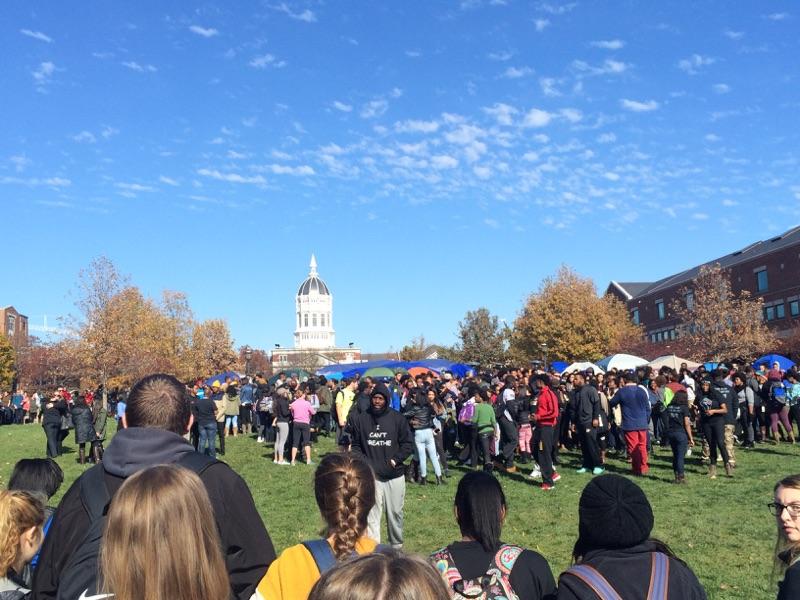

The Concerned Student 1950 movement on the University of Missouri’s campus recently succeeded in pressuring Mizzou President Tim Wolfe to step down.
Despite obvious pressure from students, faculty and other members of the Mizzou community, the mainstream media has framed Wolfe’s resignation primarily as the result of the football team’s actions. This is evident in the headlines of stories about Mizzou in both the conservative and liberal media. CNN’s Nov. 8 story is titled “Football players demand president’s resignation,” The Springfield News Leader’s Nov. 10 story reads, “Missouri players didn’t recognize how much power they had,” and STL Today’s Nov. 9 article is called, “Mizzou football protest proves players have power now.” While the football team’s support made a powerful statement, these articles downplay the impact the rest of the student movement had to affect change on Mizzou’s campus.
Concerned Student 1950, which derives its name from the first year Mizzou admitted black students, emerged recently in response to building racial tensions on campus. During September, Mizzou student Payton Head, the Missouri Students Association president, was called a racial slur by passengers in a passing vehicle, according to a Nov. 9 Bustle article.
Concerned Student 1950 then began organizing protests, sit-ins, a hunger strike, a petition signed by more than 7,000 people, and boycotts on goods and services the university profited from, which eventually included an entire football game. MU faculty also joined the cause by forming the Concerned Faculty group and organizing a two-day teach-in in place of class, according to a Nov. 9 Time article.
Members of the football team then approached Jonathan Butler — who was on a hunger strike at the time — at Concerned Student 1950’s encampment on The Quad after a couple players saw the tents one night while driving by. About 30 players met with Butler and were so moved by his case they agreed to strike until Wolfe resigned, according to a Nov. 11 ESPN article. This was strategically important for the movement, because each missed game costs the university more than $1 million. Out of all the protest tactics, the football strike seems to have been the most effective.
Does this mean the football team really enacted social change? Not quite, but it does expose a serious flaw in our education system. Like most capitalist businesses, Mizzou is run by a board of about 10 individuals who make all the university’s major decisions, including the appointment of the university president. The board of governors is selected by government officials instead of the university community, which might explain Concerned Student 1950’s demand that administrators be elected.
Furthermore, before becoming president of the Mizzou higher education system, Wolfe was a highranking manager in multinational corporation IBM, according to the World Socialist Website on Nov. 10. The president before Wolfe came from a similar background. Because Mizzou is organized like a business and run by businesspeople, it is no surprise its decisions are made based on profit calculations instead of principles of education, equality or justice. When the football team pledged its support, the movement was able to present a dollar figure cost to the university’s decision makers — something they knew how to measure.
There are two lessons we can take from Mizzou. The first is an optimistic one— college students have real power if they unite and articulate their situation. Student activists historically have made great changes, especially during the Civil Rights and anti-war movements of the 1960s and ‘70s. More importantly, we are better equipped to organize than our predecessors, and can transmit our own news without the help of the mainstream media. The Homecoming protest, where activists stopped Wolfe’s car during the parade, was posted on YouTube and now has more than 400,000 views.
The second lesson might be hard to swallow — our power to resist systematic oppression is limited by the system we resist. Ninety percent of American media, including our news, movies, soap operas, educational television and game shows, are owned by only six capitalist corporations, according to a June 2012 Business Insider article. Just like Mizzou, these six corporations are run by boards of 10-15 people with no democratic accountability to the public they are supposed to serve.
The recent events at Mizzou give us hope for a better future. As Butler said during the Homecoming demonstration, quoting Karl Marx, “We have nothing to lose but our chains.”
